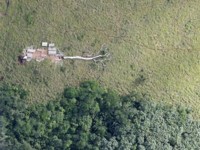Forest Carbon Market Already Shows Cracks
 It could save the rainforests of Borneo, slow climate change and the international community backs it. But a plan to pay tropical countries not to chop down trees risks being discredited by opportunists even before it starts.
It could save the rainforests of Borneo, slow climate change and the international community backs it. But a plan to pay tropical countries not to chop down trees risks being discredited by opportunists even before it starts.A forest carbon market is emerging in anticipation of a global, U.N. climate deal in December in Copenhagen, expected to allow rich countries to pay to protect rainforests as a cheap alternative to cutting their own greenhouse gases.
Officials in Papua New Guinea (PNG) have underlined how things may go awry.
Reuters has uncovered evidence of a multi-million-dollar offer of assistance from carbon brokers to a government agency, and confusion over whether offset sales were from valid projects.
There is growing interest from countries and companies in the developed world to buy the rights to the carbon stored in trees as they grow, to offset their own emissions of the greenhouse gas carbon dioxide.
But development and environment groups have long warned that suddenly placing a big value on rainforests could spur friction and even conflict in some developing nations, because of uncertain tenure rights, corruption and inadequate policing.
At a conference on the Indonesian island of Bali last week, Interpol environmental crime official Peter Younger told Reuters he expected fraudulent trading of carbon credits, as organized crime infiltrates the system of companies and countries in the developed world buying rights to the stored carbon.
Indonesia last month became the first country to set out some form of regulation for how its scheme will work, but stressed it has not yet developed a model for the most sensitive issue of revenue collection.
Papua New Guinea, which has some of the world’s fastest-disappearing rainforest and has championed the forest carbon market, established its Office of Climate Change and Environmental Sustainability (OCCES) in 2008 to develop forest protection projects.
The agency suspended in January all plans to sell rights to the carbon stored in its rainforests after deals sparked land ownership disputes, a senior official told Reuters.
For More Information: ReutersYou can return to the main Market News page, or press the Back button on your browser.

